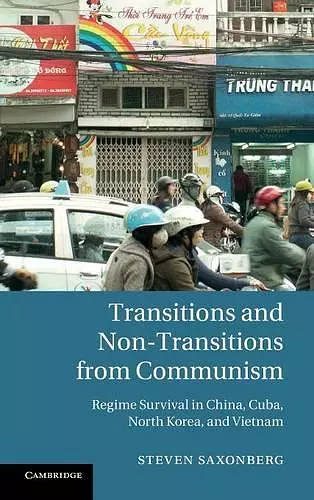Transitions and Non-Transitions from Communism
Regime Survival in China, Cuba, North Korea, and Vietnam
Format:Hardback
Publisher:Cambridge University Press
Published:14th Feb '13
Currently unavailable, and unfortunately no date known when it will be back

A unique comparative study examining why some communist regimes remain in power, whilst others have fallen.
A unique study comparing communist regimes that have lost power with those that have survived, despite the collapse of the global communist movement. Studying fourteen countries, Steven Saxonberg shows why the process of communist collapse differed among regions and discusses future prospects for the survival of existing regimes.Since the fall of the Berlin Wall, many scholars have sought to explain the collapse of communism. Yet, more than two decades on, communist regimes continue to rule in a diverse set of countries including China, Cuba, North Korea, and Vietnam. In a unique study of fourteen countries, Steven Saxonberg explores the reasons for the survival of some communist regimes while others fell. He also shows why the process of collapse differed among communist-led regimes in Europe, Africa, and Latin America. Based on the analysis of the different processes of collapse that has already taken place, and taking into account the special characteristics of the remaining communist regimes, Transitions and Non-Transitions from Communism discusses the future prospects for the survival of the regimes in China, Cuba, North Korea, and Vietnam.
'Looking at the wide range of surviving and collapsed communist regimes to compare their strengths and weaknesses, this very well-researched, thoughtful book achieves what none other has yet done so clearly and knowledgeably. It explains what generally went wrong, why some such regimes have survived, and it also makes some predictive suggestions that are very useful because they apply to other dictatorial ideological cases. This is a very welcome major addition to social science theory as well as being empirically very interesting and thorough.' Daniel Chirot, Job and Gertrud Tamaki Professor of International Studies, University of Washington
'This is an innovative and insightful comparative study of transitions and non-transitions from communism. Steven Saxonberg analyses an impressive range of cases, in Europe, Latin America and Asia, to explore the factors that shape the attenuation and collapse of communist regimes as well as their adaptation and survival. He has especially interesting things to say about the effects of changes in political legitimacy on the development of regimes and opposition strategies.' Alex Pravda, University Lecturer in Russian and East European Politics, University of Oxford
'Whereas many scholars have written on and explained in detail why communist regimes in the Soviet Union and elsewhere fell, the issue of non-transitions is still widely unexplored and unexplained. This book fills an important gap and offers a unique perspective on cases of both transition and non-transition from communism. It is rich in empirical details and a must-read - not only for transitologists but even more for social scientists and area experts who analyze cases like Vietnam, China and Cuba and who wonder if, when and how spring might come.' Joerg Wischermann, Institute of Asian Studies and German Institute of Global and Area Studies (GIGA), Hamburg
'This interesting book examines a range of factors that lead to different types of regime collapse … regimes inspired in part by Marxism across the globe will benefit from reading this book … Recommended. Upper-division undergraduates and above.' M. D. Rothwell, Choice
ISBN: 9781107023888
Dimensions: 231mm x 155mm x 28mm
Weight: 660g
364 pages